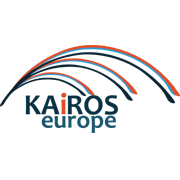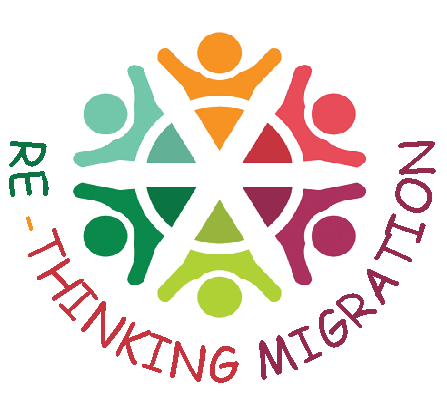Today we would like to share with you the reflections written by one of our participants. Anya took part in one of the training session we held in Italy as part of the ARISE and Rethinking Migration projects, in June of 2019. This entry appeared for the first time here on the Migration Research Group Blog. Thank you Anya for sharing your reflections with us!
In June this year, I took part in the combined Rethinking Migration/ARISE (Analysing Refugee Inclusion in Southern Europe) training course in Lamezia Terme, Italy which focused on education and employment. The topics ranged from border policies across Europe and the Italian integration system to mental health approaches and the media. As well as covering these topics, the course brought together like-minded experienced professionals, academics and practitioners with a wide range of backgrounds. Some participants have worked with unaccompanied minors, others in employment, homelessness or mentoring. In addition, the expertise was truly international, from the U.K. and Latin America to North America, China and India. This richness in experience created stimulating discussions in and out of sessions and also allowed many different perspectives on migration to be heard, giving a holistic account. As well as giving a day-to-day account of the training, I have written more in more detail on my five highlights from the week.
Day 1:
Session 1: Perception of migration phenomenon in Italy and Southern Europe: an historic perspective
The first highlight of the week was our first session with Gianmarco Marzola, who introduced the group to the history of emigration and immigration in Italy, highlighting the change in laws and perception of migration over time with different migration spikes. As Gianmarco is an anthropologist, we touched upon interesting subjects involved in the perception of migration, for example magic. Moreover, he emphasised the similarities between the current narrative in Italy surrounding migrants and refugees and the reception Italians faced emigrating to America. In the following session, we had an interesting discussion on the nature of the European border in 2019, looking at the different actors involved at various stages and emphasising the porous nature of the border in 2019.
Session 2: Meeting with cultural mediators
After lunch, we met two cultural mediators and they spoke about their role for migrants and refugees and how they think the system need to change. They work in schools, hospitals and in the interview process to not only translate language differences but also any cultural differences between Italians and migrants.
Day 2:
Session 1: Social Media: From disinformation to discrimination
In this lecture Jessica Sofizade introduced us to the concepts of ‘digital native’, ‘digital immigrant’ and ‘digital wisdom’. We looked at the rise of fake news, alternative facts and what this means for the spread of misinformation and disinformation around migration. Finally, we touched upon the particular dangers young people face on social media.
Session 2: Economic migrants and refugees: combatting the idea that some people deserve our compassion whilst others don’t, & Session 3: Tolerance & Intolerance: Should we be tolerant of intolerance?
Laura Marziale led us through group discussions looking at different categories related to the concept of migrant. In reality, distinctions are blurred and people are not fixed into neat boxes as public policy and legal frameworks dictate. We discovered the basic needs are the same across the groups but the services provided are varied. We discussed the concept of tolerance and intolerance: are tolerant societies what we should be aiming for?
Day 3
Session 1: How refugees can be affected by mental health issues and how to identify the signs
My second and third highlights from the week were the sessions that Matilde Spoldi ran on mental health and European border policies. She first explained the difference between the Western medicine approach and the medical anthropological approach to mental health issues. Matilde explained the symptoms of PTSD, depression, anxiety and the particular struggles that lead to mental health issues before departing the state, during the flight stage and after arrival in the new state. We discussed issues such as how migrants can feel Westerners impose a victimhood on all migrants, the shame relating to mental health issues amongst non-Western cultures and the challenges that this consequently brings to treating mental illness.
Session 2: Migration at the borders: differences between Southern, Eastern Europe reactions
Matilde went through the Balkan states reaction from 2015, as well as placing this reaction in the larger context of the Turkey and Libyan deals with Europe. In particular, we looked at the political developments and reception of refugees in Serbia, Croatia, Slovenia, Hungary, Turkey and Libya. This session highlighted the external political factors and manoeuvrings at play in which migrants and refugees were often used as a ‘political football’ for state gain. For example, whether the state was an EU member or wanted to be affected their reception
Lunch at the Caritas reception centre:
My fourth highlight of the week was the visit the Caritas reception centre where we were lucky enough to share lunch with the residents and volunteers. The centre currently houses 7 men currently whilst they are awaiting a response on their asylum claim. The residents had cooked us a huge variety of traditional Kurdish dishes and Italian food. We ate and got to know each other and it was not too long until the residents and volunteers turned on the music and started dancing. The volunteers told us the funding now is uncertain for the centre as they refused to sign up to the new regulations which dictates that centres must take more people. The personal touch of this centre was, understandably, not something the organisation was willing to lose, and we could see the community spirit it created in just one afternoon.
Day 4:
Session 1: Understanding the solutions practitioners put in place
Alessandra Cugnetto from Itaka Training explained the two phases of reception for asylum seekers and refugees in Italy: the hotspot reception centres and the SPRAR projects. By learning about the Italian system, from funding opportunities to the multidisciplinary teams in SPRAR projects, we were able to compare the Italian approach to the systems in our home countries.
Session 2: Homelessness and Migration.
Marina D’Arco, an experienced employment worker, presented on the link between homelessness and migration. We heard about London as a case study, how the asylum system can lead to homelessness and the charities working to combat this.
After these sessions, we were welcomed to a Caritas centre providing food for the local homeless population, including refugees, and we heard from the volunteers about how vital their work is. Following this, in the next session we heard about the migrant policies and public opinion in participants’ home countries: Canada, U.S., India, Japan and China. This was my fifth highlight of the week as I learnt a great deal, from the lack of legal framework or definition of asylum seeker in India to the anti-immigration policies in Japan. Specifically, this information places the European migration experience in the global context and made us all aware of the co-existing struggles occurring in other regions and states.
Day 5:
On our final day Alessandra Cugnetto ran a session on cultural integration and we interrogated what culture means and the complexity of personal cultural identity. This was followed by a session, ‘I know and I don’t know: a personal process towards the therapeutic relationship’, run by Claudia Sgro, a psychologist and psychotherapist involved in a few SPRAR projects in Calabria, in which she explained a strategy for best practice. One should start from a point of asking questions and not to make assumptions regarding experiences or feelings of asylum seekers or refugees. The rest of our time was spent reflecting on each day and what we had learnt in the week.
My understanding of migration expanded vastly due to this course and I encourage King’s Migration Research group members to apply for the next training courses. Follow the links for more information on how to apply to ARISE or Rethinking Migration.
See below for some photos of the training:
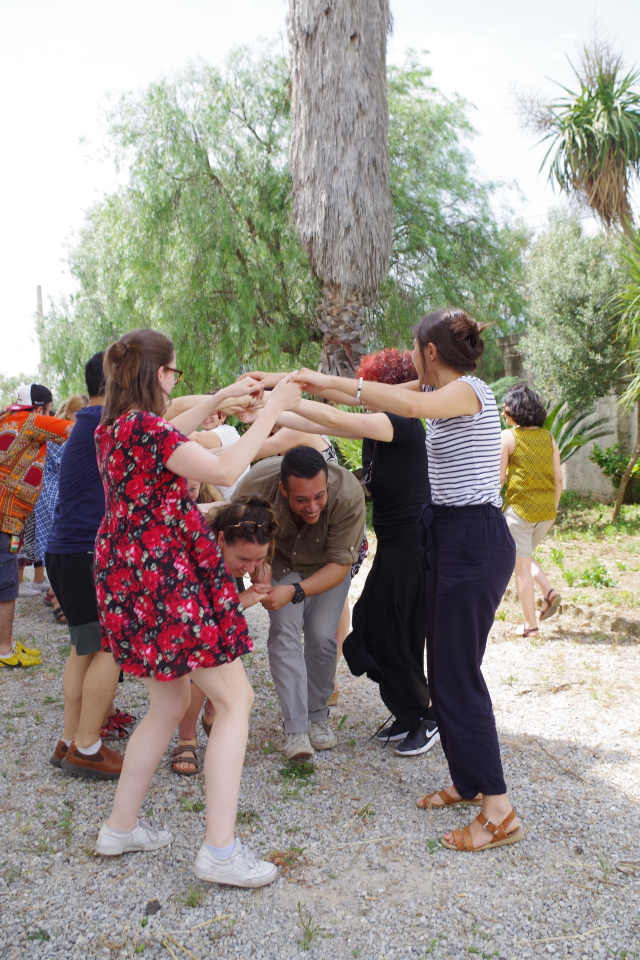
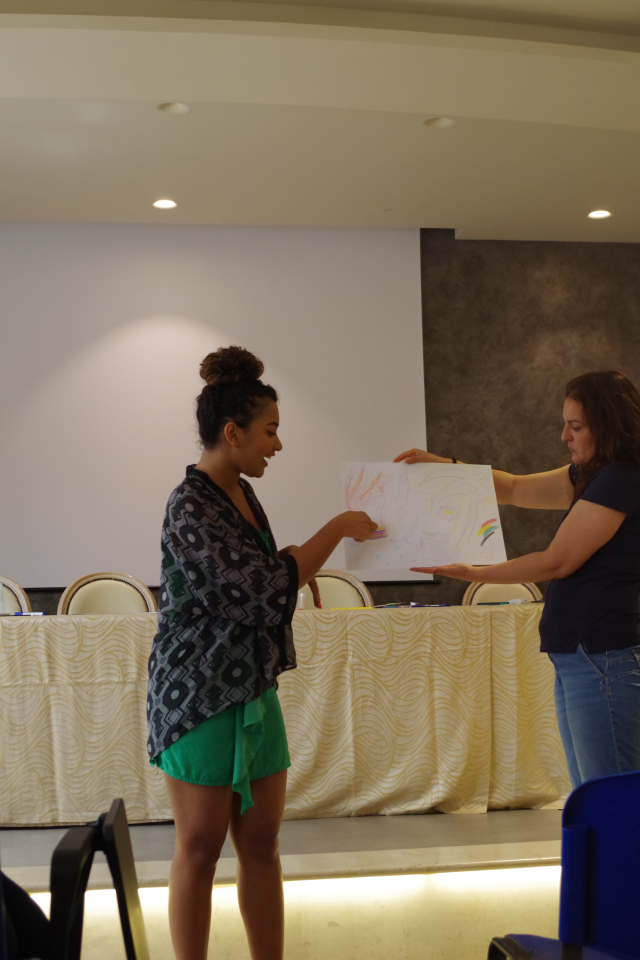
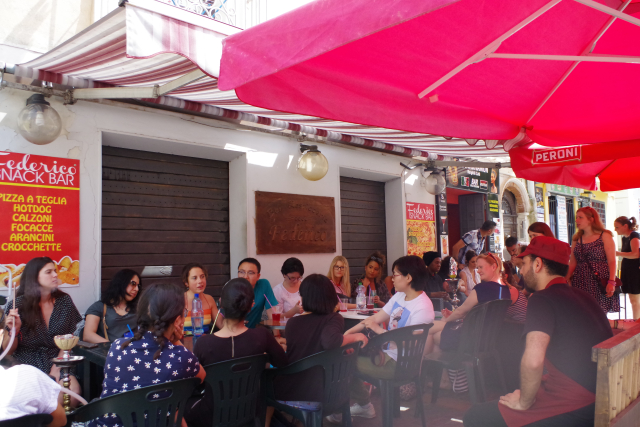
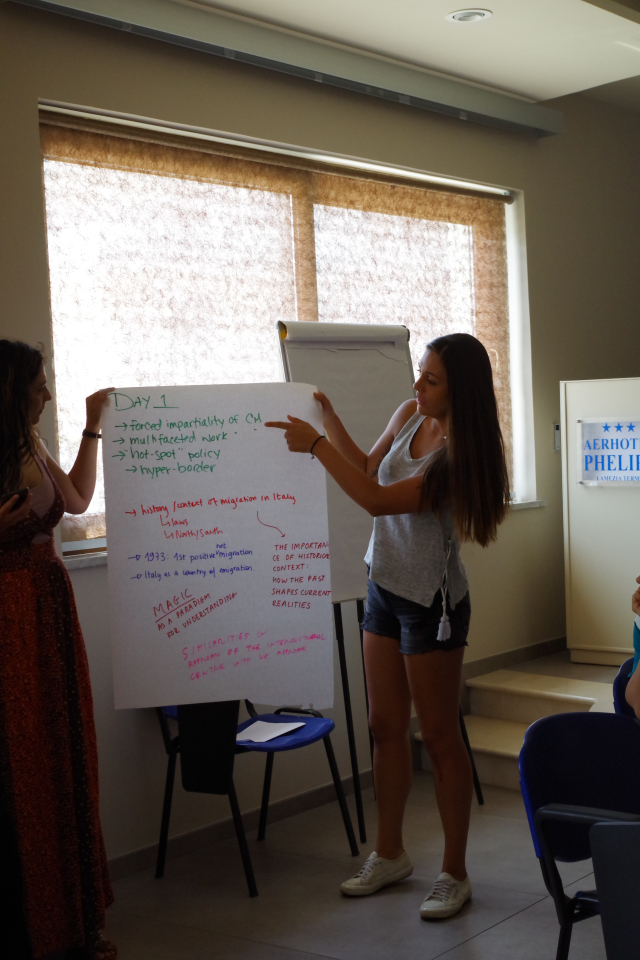
The views and opinions expressed in this article are those of the authors and do not necessarily reflect the official positions of Kairos Europe, its partners or their employees.
